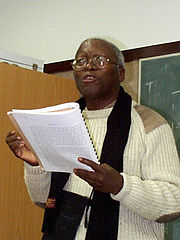Lewis Nkosi
 On 5 September 2010, South African writer, university teacher and journalist Lewis Nkosi died in Johannesburg at the age of 73. He spent 30 years in exile as a consequence of restrictions placed on him and his writing by the Suppression of Communism Act and the Publications and Entertainment Act passed in the 1950s and 1960s.
On 5 September 2010, South African writer, university teacher and journalist Lewis Nkosi died in Johannesburg at the age of 73. He spent 30 years in exile as a consequence of restrictions placed on him and his writing by the Suppression of Communism Act and the Publications and Entertainment Act passed in the 1950s and 1960s.
Nkosi was born on 5 Dcember 1936 in a place called Embo in KwaZulu-Natal, South Africa. He attended local schools, before enrolling at M. L. Sultan Technical College in Durban. In his early twenties he began working as a journalist, first in Durban, joining the weekly publication Ilanga lase Natal ("Natal sun") in 1955, and then in Johannesburg for Drum magazine and as chief reporter for its Sunday newspaper, the Golden City Post, from 1956 to 1960. He contributed essays to many magazines and newspapers. His essays criticised apartheid and the racist state, as a result of which the South African government banned his works.
Nkosi faced severe restrictions on his writing due to the publishing regulations found in the Suppression of Communism Act and the Publications and Entertainment Act passed in the 1950s and 1960s. His works were banned under the Suppression of Communism Act. At the same time, he became the first black South African journalist to win a Nieman Fellowship from Harvard University to pursue his studies. When he applied for permission to go to United States, Nkosi was granted a one-way exit permit to leave South Africa, thus being barred from returning. In 1961, accepting the scholarship to study at Harvard (1961–1962).
Moving to London, Nkosi obtained work with the BBC and between 1962 and 1965 produced the radio programme Africa Abroad, also interviewing major African writers for the television series African Writers of Today on NET, and serving as literary editor for The New African magazine (1965–1968). In 1970 he was visiting Regents professor at the University of California-Irvine, and having earned a BA degree in English literature from the University of London (1974) and an MA from the University of Sussex (1977), he went on to become a Professor of English at the University of Wyoming (1991–91), as well as holding visiting teaching positions at universities in Zambia and in Warsaw, Poland.
Lewis Nkosi returned to South Africa in 2001. His final years before his death in 2010 were passed in financial difficulties and ill health.
(Source: Wikipedia)
Selected publications
Lewis Nkosi : the black psychiatrist & flying home! : texts, perspectives and homage / Dag Henrichsen; Astrid Starck. - Basel : Basler Afrika Bibliographien, 2021
Writing Home: Lewis Nkosi on South African Writing / Lindy Stiebel; Michael Chapman. - Scottsville, Kwazulu-Natal: University of Kwazulu-Natal Press, 2016
Letters to my native soil : Lewis Nkosi writes home (2001-2009) / Lindy Stiebel; Therese Frey Steffen. - Zürich ; Münster : Lit Verlag, 2014
Mandela's ego / Lewis Nkosi. - Roggebaai : Umuzi, 2006
Still beating the drum : critical perspectives on Lewis Nkosi / Lindy Stiebel; Liz Gunner. - Amsterdam [etc.] : Rodopi, 2005
Underground people / Lewis Nkosi. - Cape Town : Kwela Books, 2002
Mating birds : a novel / Lewis Nkosi. - New York : St. Martin's Press, cop. 1986
Home and exile and other selections / Lewis Nkosi. - Nkosi, Lewis, 1936-2010, London [etc.] : Longman, 1983
Tasks and masks : themes and styles of African literature / Lewis Nkosi. - Harlow : Longman, 1981
The transplanted heart : essays on South Africa / Lewis Nkosi. - Benin City : Ethiope publishing corporation, 1975
Lewis Nkosi - What started me writing?
Timeline of 20the-century South African male writers via DBpedia and Wikidata

